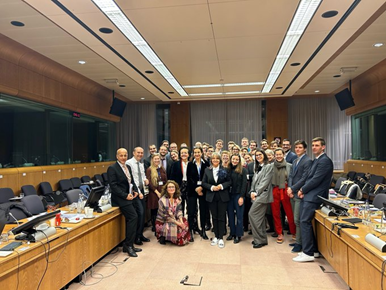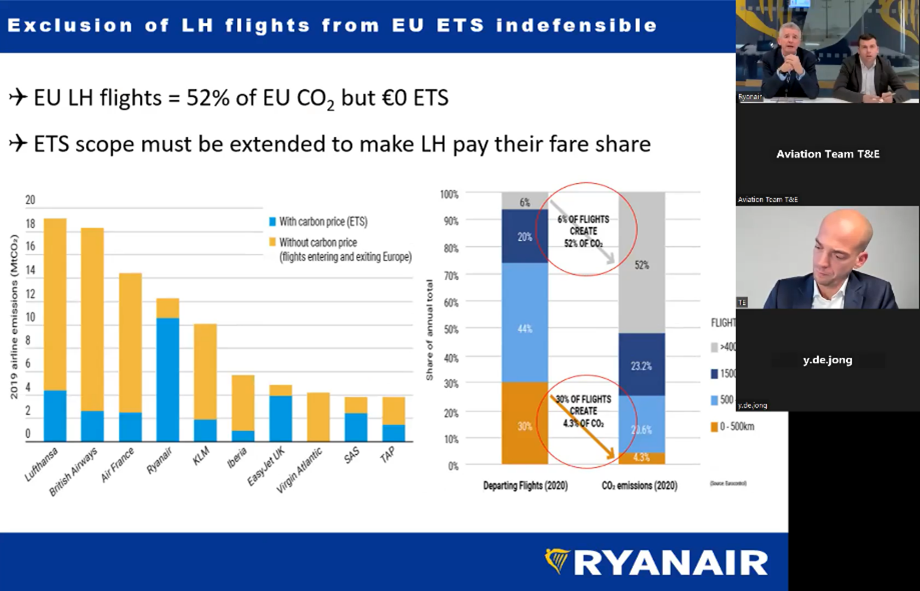Listen to the Ishka View Extra
in ESG and Sustainable Aviation
January 2023
Ishka View Extra: ESG and Sustainable Aviation report
This January 2023 issue covers developments during November and December 2022.
ESG issues permeate every aspect of aviation finance and the industry’s long-term strategies have a duty to improve in all three areas. At the same time, the worsening climate crisis has made environmental sustainability a key priority. The global share of greenhouse gas (GHG) emissions from flying has increased steadily, with global aviation emissions doubling since the mid-1980s. The industry has a responsibility to reduce its environmental impact whether through technological innovation and voluntary decarbonisation commitments, or regulator-led initiatives like green finance taxonomies, SAF mandates, taxes, or emissions criteria.
For feedback and news tips, please email eduardo@ishkaglobal.com .
KEY TAKEAWAY: EU AGREES AVIATION ETS CHANGES BUT SAF RULES SLIP INTO 2023
THE ISHKA VIEW
• The EU continues to make inroads in its advancement of the ‘polluter pays principle’ including for aviation. The final legislative position on Aviation EU emission trading scheme (ETS) reform encapsulates this, raising the price of polluting faster over the next two years to already as much as €5 billion ($5.28 billion) by 2025 – around five times of what it paid in 2019 – according to estimates by Airlines for Europe.
• In the EU’s race to achieve greenhouse gas emissions (GHG) reductions of at least 55% by 2030 (compared to 1990 levels), aviation was always expected by all stakeholders to have to play a bigger part. However, whether EU member states would dare put an end to the exclusion of extra-EEA flights from its ETS was less clear. Finally, a conservative position has prevailed, kicking the can down to 2026.
• The onus is now on ICAO to raise the ambitions of CORSIA in its 2025 Assembly to convince the EU that international flight emissions outside the EEA should remain its exclusive purview. But Brussels has become increasingly bold in its handling of GHG resulting from European economic activity beyond its borders, such as efforts to introduce a Carbon Border Adjustment Mechanism (CBAM). If this boldness extends to air travel again in 2026, it could once again upset major powers such as the US and China, which back in 2012 used Airbus orders to pressure the EU into not including international flights in its ETS.

| Trilogue negotiators on 7th December 2022. Source: EU Climate Action |
EU trilogue* negotiations in December resulted in a final legislative decision to tighten the EU ETS application to aviation as part of the EU’s ambitious environmental Fit for 55** package, while other legislative proposals under the package – notably the ReFuelEU Aviation proposal introducing SAF mandates – saw its final deliberation slip into 2023.
EU aviation emissions to cost more from 2026
In the early hours of 7th December, the EU Council and the European Parliament reached an agreement on the EU ETS Aviation reform which paves the way for a faster phase-out of free airline emissions allowances and introduces a system to monitor, report and verify (MRV) non-CO2 emissions as well as a “SAF allowances” pricing scheme. The political agreement must now be formally adopted by the European Parliament and the Council. Once this process is completed, the new rules will be published in the Official Journal of the European Union and enter into force.
The newly agreed measures accelerate the implementation of the ‘polluter pays principle’ and comprise:
- Free allowances out by 2026: Free emissions allowances for airlines covered by the EU ETS will be phased out a year earlier than originally planned, which will raise the operational cost of impacted airlines. Emission allowances will be phased out gradually from 2024 (25% reduction) and into 2025 (50%). Once phased out, airlines will be subject to full auctioning of allowances.
- SAF allowances: Twenty million free allowances (worth approximately €1.6 billion or $1.69 billion) will incentivise the uptake of sustainable aviation fuel (SAF). All fuels eligible under RefuelEU, except fuels derived from fossil fuels, will be eligible for the SAF allowances. The mechanism will be in place until 2030. Small islands, small airports and outermost regions will be able to cover the price differential between kerosene and eligible fuels with 100% of the SAF allowances to ensure the availability of the eligible fuels in these locations with specific supply constraints. For all other airports, the coverage of the price differential will be modulated according to the type of fuel: 95% for renewable fuels of non-biological origin (RFNBOs), 70% for advanced biofuels, and 50% for other eligible fuels.
- Non-CO2 MRV: Airlines to start reporting non-CO2 effects (harmful gases, soot particles, contrail formation) from 2025, with a legal proposal in 2027 to codify an extension of the ETS to cover non-CO2 effects.
As regards the use of revenues, co-legislators agreed to transfer five million of allowances from the aviation sector to the Innovation Fund, a large funding programme for the demonstration of innovative low-carbon technologies.
Airline trade association Airlines for Europe (A4E) criticised in a statement on 7th December the accelerated phase-out of emission allowances saying the cost of compliance for the ETS is likely to have increased five times in size by 2025 to over €5 billion ($5.27 billion) annually. However, A4E welcomed the introduction of a SAF allowances system.
A CORSIA ‘last chance’ decried by environmentalists… and Ryanair
The agreement reached means the European Commission must assess by 1st July 2026 (after the next ICAO Assembly in 2025) whether CORSIA, ICAO’s global flight carbon offsetting instrument, is an effective system to reduce global air travel emissions. If the EU Commission concludes that CORSIA is insufficient, the ETS can begin to apply to international flights departing from the EEA from 2027. However, the provisional continuation from the EU ETS of the extra-EU flight exclusion (a ‘stop the clock’ mechanism introduced in 2012, when a previous proposal to include them succumbed to international and industry pressure) remains contentious and is juxtaposed with a recent decision to incorporate 50% of all incoming and outgoing shipping voyages to and from the EU to the EU ETS.
Green MEP Bas Eickhout says the exclusion gives ICAO a “last chance” to improve CORSIA, a ‘last chance’ which appeases in particular long-haul airlines (IATA earlier in 2022 expressed “concern” at the EU Parliament’s now-failed proposal to expand the EU ETS scope).
But the EU’s compromise on international flights (a result of EU member states blocking the Parliament’s proposal) has been criticised by observers and environmental groups. Jonathan Packroff, a policy reporter at Euractiv, cautioned that using CORSIA as an excuse to delay the inclusion of international flights in the EU ETS further proves warnings by critics of CORSIA – a scheme with lower decarbonisation incentives. ICAO’s CORSIA does not require the offsetting of international aviation emissions, but only those above an 85% threshold based on 2019 levels and using offsets that are significantly cheaper than ETS emission allowances.

Unusual bedfellows: T&E and Ryanair join forces to criticise the exclusion of extra-EEA flights from the EU ETS until at least 2027.
The outcome is also favourable for legacy airlines with long-haul routes, which has prompted low-cost Ryanair to join forces with an unlikely ally, NGO Transport & Environment, to decry their exclusion. In a joint webinar, T&E Executive Director William Todts and Ryanair CEO Michael O’Leary criticised the “injustice” of the exclusion. T&E also criticised it in its website, saying restricting EU ETS coverage to intra-EEA flights will “see another lost decade in tackling emissions” as it leaves 58% of Europe’s aviation CO2 emissions unaccounted. T&E, however, lauded the inclusion of a non-CO2 MRV.
On a related CORSIA development, the Council of the EU on 19th December 2022 adopted a decision enabling member states to fulfil their first annual CORSIA obligation to notify operators’ emissions.
Final SAF mandate deliberation slips into 2023
According to Euractiv, negotiators on the ReFuelEU Aviation proposal are set to reconvene in January 2023 when Sweden takes over the EU Council presidency. Euroactiv understands that including nuclear as a potential power source for creating e-fuels was a red line for the Parliament’s socialist and green lawmakers, who reportedly dragged a late-evening trilogue session on 8th December until a 5:00 AM stalemate. Euroactiv reports that a Commission suggestion to use a negative multiplier of 0.75 for nuclear-based e-fuels – which would allow but disincentive them – failed to break the impasse. Two groups also wanted to see the possibility of national SAF mandates included in the final agreement.
In an interview with Argus Media on 15th December, European Biodiesel Board (EBB) secretary general Xavier Noyon said the EBB wanted the EU to broaden the range of feedstocks beyond advanced ones listed in the renewable directive's Annex IX to so-called mature feedstocks listed in Part B but “that looks like it's not going to happen.”
For a recap of the main points of contention on the ReFuelEU Aviation proposal, see this Twitter thread by Euractiv transport correspondent Sean Goulding Carroll. Separately, since the last ESG Extra, T&E has joined forces with the Global Powerfuels Alliance to call on the EU Member States and the European Commission to endorse a 2% e-kerosene target in 2030, as adopted by the European Parliament.
EU Commission green-lights France’s short-haul ban
Finally, while not part of the Fit for 55 package, the European Commission has set an important precedent in allowing France to go ahead for an initial period of three years with its plan to ban short-haul flights on environmental grounds between city pairs where time-competitive rail alternatives exist. The French measure prohibits scheduled public passenger air transport services “on all air routes within French territory for which there are several direct rail connections per day, in each direction, of less than two and a half hours.”
Initially, the measure will only affect three routes between Paris-Orly and Bordeaux, Nantes and Lyon – fewer than the eight routes originally targeted, but the number could increase if rail connections improve (such as those replacing flight routes between Paris Charles de Gaulle and Lyon and Rennes, and between Lyon and Marseille) or if rail journey times are further shortened (such as Paris CDG to Bordeaux and Nantes). The measure has been criticised by airlines. European Regions Airline Association (ERA) director general Monsterrat Barriga referred to it as “sustainable theatre” in a LinkedIn post. T&E welcomed it but highlighted it only covers 0.3% of France’s air travel emissions.
Separately, in a related development, French state-owned rail company SNCF has been criticised for greenwashing its own emissions vis-à-vis aviation. According to a report by Le Point on 13th December, the train operator claimed high-speed trains were 80 times less carbon intensive then air travel. The French National Aviation Merchant Federation (FNAM) brought a case against the campaign at France’s advertising ethics jury, who on 5th December sided with FNAM. For a roadmap to how airlines can avoid greenwashing accusations, consultancy Simplifying has a new whitepaper.
COP27: EU suggests aviation levies for landmark fund
Away from Brussels, European Commission climate policy chief Frans Timmermans said at COP27 that innovative sources of finance would be needed to fund the landmark Loss and Damage facility announced at the summit, including levies on aviation, shipping, and fossil fuels. Irish environment minister Eamon Ryan made similar comments upon returning from COP27. Ishka Insights subscribers can find a detailed summary of COP27 aviation developments here.
* Trilogues are held between representatives from the EU’s three legislative bodies: the European Commission, the European Parliament, and the Council of Europe. ** For a re-cap on the aviation implications of the Fit for 55 package see previous editions of Ishka’s ESG Extra or listen to this 24th November 2022 Euractiv podcast discussing the “death” of cheap flights.
To download the complete report, click on the link below:

